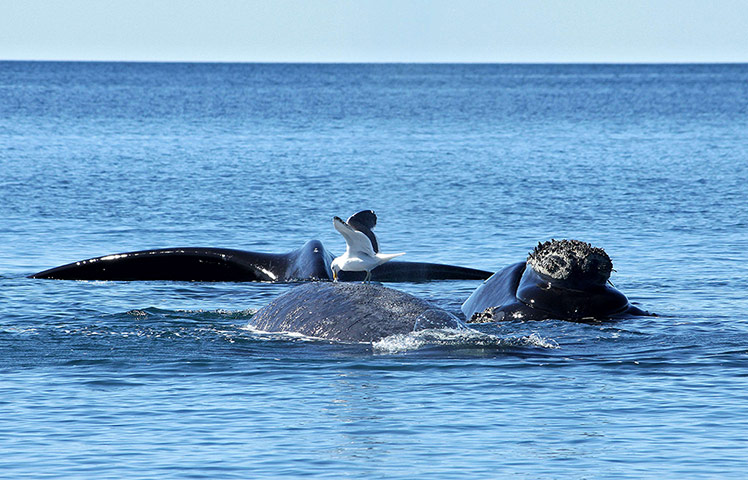TOP STORIES
Wounded seal found on Cornish coast had bovine TB
A wounded seal pup that washed up on a Cornish beach was put down after contracting bovine TB, vets say. The government said the "unusual" incident demonstrated that bovine TB could spread between species.
Vet Andy Biggs said it may have been from a badger bite after a badger possibly came into contact with the pup after being attracted by the placenta.
... Tests by government vets at the Polwhele Veterinary Laboratory near Truro found it was suffering from bovine TB. The vets said they believed it was the first time a seal had been diagnosed with the disease.

Finches still susceptible to disease
 |
| A screenshot of a completed wildlife health report in WHER. Click image to view past report on a sick house finch. |
Researchers at the Cornell University Laboratory of Ornithology, Ithaca, N.Y., say the disease has decreased from epidemic proportions to a much smaller percentage.
... While infected birds have swollen eyes, the disease particularly affects the respiratory system. It is caused by the bacterium, Mycoplasma gallisepticum, which poses no threat to humans....Current evidence suggests that infected birds do not acquire immunity to future infections, and there is no known cure.
The Cornell lab continues to conduct a house finch disease survey, providing an opportunity for citizens to help researchers track the spread of the disease. The survey is easy to do: participants watch their feeders, record the visits of house finches and American goldfinches, and the occurrence of disease symptoms.
Illegal wildlife trade threatens international security
The illicit trade in endangered animals has grown to the fourth-largest kind of illegal trade worldwide, sparking concern about links to militants and organized crime in developing nations.
... Now worth $19 billion annually, the black market in animals and their parts, notably ivory and furs, threatens to eradicate many of the most iconic of wild species, such as rhinos, elephants and tigers.... About 1,000 forest rangers worldwide have been killed in the past decade, she notes, often at the hands of militants involved in insurgencies. "We can't just see this as an environmental problem anymore, when it has grown into a criminal and security one."
The report comes as international observers have become more concerned about links between the illegal animal trade and terror groups in Africa and Asia. Last November, then-secretary of State Hillary Rodham Clinton declared illegal wildlife trade a security threat. In May, U.N. Secretary-General Ban Ki Moon released a report linking the Lord's Resistance Army militant group to the illegal ivory trade and slaughter of elephants in Central Africa.
OTHER WILDLIFE HEALTH RELATED NEWS
- SC professor to look for virus at animal refuge [Hobcaw Barony wildlife refuge, South Carolina, USA]
- FWP Surveys Hunters And Landowners On Wildlife Disease [Chronic Wasting Disease][Montana FWP news release]
- Deadly Bat Disease Spreads In NC Caves [audio broadcast][North Carolina, USA]
Wildlife At Risk
- Surprise Species at Risk from Climate Change [Cited journal article HERE]
- Outlook Is Grim for Mammals and Birds as Human Population Grows [Cited journal article HERE]
- Wisconsin DNR suspects virus killed hundreds of carp [View cases reported in news in Wisconsin, USA on Global Wildlife Disease News Map
 ]
] - Fish kill reported in Runnemede's Hirsch Lake; 300-500 carp affected [Runnemede, New Jersey, USA - Map It
 ]
]
- First case of avian West Nile virus in Marin confirmed for 2013 [San Anselmo, California, USA - Map It
 ]
] - West Nile Virus Found in Palos Verdes [Crows][View cases reported in the news in California, USA on the Global Wildlife Disease News Map
 ]
] - Bird Found in Roseville with West Nile Virus [Robin][Roseville, California, USA - Map It
 ]
] - Two dead birds in Modesto test positive for West Nile [Modesto, California, USA - Map It
 ]
] - 1st bird in Wisconsin tests positive for West Nile virus this year [Washington Co., Wisconsin, USA - Map It
 ]
]
- New bird flu kills more than a third -- but less deadly than earlier virus
- Chinese Warn of Possible Re-Emergence of Bird Flu
- CDC reports H6N1 avian flu infection
- New Viruses Found in Asia and Africa Tentatively Linked to Neurological Disease
- Wild Animal Tests Positive For Rabies In Pueblo Co. [bat][Colorado, USA]







No comments:
Post a Comment